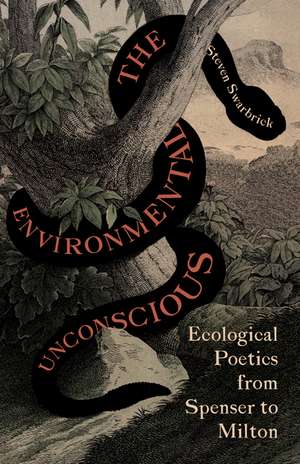The Environmental Unconscious: Ecological Poetics from Spenser to Milton
Autor Steven Swarbricken Limba Engleză Paperback – 28 mar 2023
Why has psychoanalysis long been kept at the margins of environmental criticism despite the many theories of eco-Marxism, queer ecology, and eco-deconstruction available today? What is unique, possibly even traumatic, about eco-psychoanalysis? The Environmental Unconscious addresses these questions as it provides an innovative and theoretical account of environmental loss focused on the counterintuitive forms of enjoyment that early modern poetry and psychoanalysis jointly theorize.
Steven Swarbrick urges literary critics and environmental scholars fluent in the new materialism to rethink notions of entanglement, animacy, and consciousness raising. He introduces concepts from psychoanalysis as keys to understanding the force of early modern ecopoetics. Through close readings of Edmund Spenser, Walter Ralegh, Andrew Marvell, and John Milton, he reveals a world of matter that is not merely hyperconnected, as in the new materialism, but porous and off-kilter. And yet the loss these poets reveal is central to the enjoyment their works offer—and that nature offers.
As insightful as it is engaging, The Environmental Unconscious offers a provocative challenge to ecocriticism that, under the current regime of fossil capitalism in which everything solid interconnects, a new theory of disconnection is desperately needed. Tracing the propulsive force of the environmental unconscious from the early modern period to Freudian and post-Freudian theories of desire, Swarbrick not only puts nature on the couch in this book but also renews the psychoanalytic toolkit in light of environmental collapse.
Preț: 237.11 lei
Nou
Puncte Express: 356
Preț estimativ în valută:
45.37€ • 47.47$ • 37.69£
45.37€ • 47.47$ • 37.69£
Carte indisponibilă temporar
Doresc să fiu notificat când acest titlu va fi disponibil:
Se trimite...
Preluare comenzi: 021 569.72.76
Specificații
ISBN-13: 9781517913816
ISBN-10: 1517913810
Pagini: 336
Ilustrații: 5 black and white illustrations
Dimensiuni: 140 x 216 x 25 mm
Greutate: 0.48 kg
Editura: University of Minnesota Press
Colecția Univ Of Minnesota Press
ISBN-10: 1517913810
Pagini: 336
Ilustrații: 5 black and white illustrations
Dimensiuni: 140 x 216 x 25 mm
Greutate: 0.48 kg
Editura: University of Minnesota Press
Colecția Univ Of Minnesota Press
Notă biografică
Steven Swarbrick is assistant professor of English at Baruch College, City University of New York.
Recenzii
"Situating early modern poetry in conversation with Lucretius and Lacan, The Environmental Unconscious resists conventional critical distinctions between linguistic and materialist turns. Steven Swarbrick argues that matter, no less than the unconscious, is structured like a language: lively nonhuman matter, no less than the disembodied Cartesian cogito, is characterized by loss and self-estrangement. Because early modern poets take the environmental unconscious as the model for human desire (rather than vice-versa), Swarbrick shows, this body of work offers an overlooked yet urgent mode of theorizing life beyond the human."—Melissa E. Sanchez, University of Pennsylvania
"An overdue methodological detour from historicist business as usual, this sharply original book binds Spenser and Derrida, Ralegh and Glissant, Marvell and Deleuze, and Freud and Milton into vivid new relationships. Steven Swarbrick’s ‘environmental unconscious’—a structurally consequential but radically inhospitable alterity lodged within both conceptions of matter and their literary analogues—drives thrilling new readings of early modern literature as it renews the possibilities offered by psychoanalysis for thinking poetic form."—Drew Daniel, author of Joy of the Worm: Suicide and Pleasure in Early Modern English Literature
"An overdue methodological detour from historicist business as usual, this sharply original book binds Spenser and Derrida, Ralegh and Glissant, Marvell and Deleuze, and Freud and Milton into vivid new relationships. Steven Swarbrick’s ‘environmental unconscious’—a structurally consequential but radically inhospitable alterity lodged within both conceptions of matter and their literary analogues—drives thrilling new readings of early modern literature as it renews the possibilities offered by psychoanalysis for thinking poetic form."—Drew Daniel, author of Joy of the Worm: Suicide and Pleasure in Early Modern English Literature
